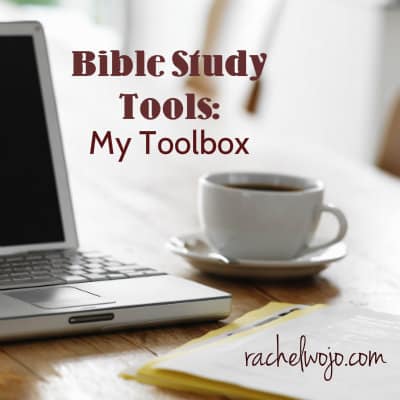Bible Study Tools – My Toolbox
Disclosure: This post may contain affiliate links, meaning if you decide to make a purchase through my links, I may earn a commission at no additional cost to you. See my disclosure for more info.

Thank you so much to all of you who send emails asking for recommendations. I love helping you find the tools and technology to meet your Bible study and prayer needs; after all, it’s part of my mission statement here! One of my most recent requests asked for information about the specific study tools I like to use for Bible study,so today I thought it would be fun to outline the resources I frequently use for Bible study, Bible research, and writing research. In no particular order, below you will find my favorite Bible study tools- my toolbox, if you will.
1. Bible Apps
Bible Apps are a wonderful, easy way to read the Bible. Their convenience and affordability make them incredibly useful. Who ever dreamed of carrying their entire Bible, along with commentaries, concordances, etc, in their pocket? For a daily Bible reading app, I recommend the Olive Tree Bible Study app and this app is what I’m using to make progress on the Bible Reading Challenge here on the blog. But Bible apps each have their own wonderful features and if you want the scoop on individual Bible apps, I recommend this post that analyzes the best features of each Bible app.
2. Online Bible Resources
Online Bible websites are so much more than reading tools; the keyword search capabilities and translation comparisons are such a vital part of Bible study. While there are many online Bible resources, the three I find myself using the most, in order, are:
- Bible Gateway (The new beta site is so streamlined and easy to use! You can get a sneak peek here.)
- Blue Letter Bible
- Bible Hub
3. Bible Study Software
Bible Study software contains the most in-depth study capabilities and comparisons at the click of a button. I’ve used Olive Tree Bible Study software for about 2 years and love the way it syncs with the app. My bookmarks and highlights, etc. all transfer from one to the other. I love this because I often work on my laptop when I’m in areas without WIFI. When I have a few minutes and want to take a second look at something I’ve highlighted or studied when I’m back in the WIFI zone, then I can do so on the app. Love this flexibility!
More recently I’ve been introduced to and using Logos Bible Software. My laptop is a couple years old and I use it a ton. I’m known to have so many windows open that the computer catches a cold, if you know what I mean. I said that to say that my particular laptop runs this software a bit slower than I’d like. HOWEVER, Logos Bible software is power-packed. With tons of free ebooks and resources, the Bible information available on this software is magnificent. You want the background and history of a Bible character? You can get it. You want maps? Available. The number of resources you can purchase on this software versus owning a paper or hardback library of the same resources is incomparable. I truly can’t say enough about the study resources available in this software. I’ll be providing more information about this product in the future for sure.
4. Commentaries and Concordances
Technology is incredible and wonderful and I love it. But sometimes I get the books out and spread them out everywhere. I know it’s old school, but paper makes me think in a different pattern and gives my brain the opportunity for a different style of studying. I’ve noticed it causes me to slow down and reflect a bit more also. So while I embrace everything I listed above, sometimes a girl just needs paper. And when I do, here are my go-to items:
The Strongest Strong’s Exhaustive Concordance of the Bible
When I was a little girl, my dad propped up this concordance on the dining room table almost every week as he studied to teach his Sunday School class (which he has done for almost 40 years!) Maybe the nostalgia of that alone keeps me doing the same. However,if you want to study the original languages in which the Bible was written, this concordance is the key.
Matthew Henry’s Commentary on the Whole Bible: New Modern Edition [6 volume – Set]
This commentary has been used by Bible scholars for over 300 years and is classic. You can also purchase a full commentary ebook for just $2.99.
Once you have a concordance and a commentary, the last Bible study tool I recommend in paper form is a dictionary.
Vine’s Complete Expository Dictionary of Old and New Testament Words: With Topical Index
The dictionary I’m recommending above is complete and expository. If you’d like a simpler version of any of the above-mentioned study resources in paper form, concise versions are available for each of them.
And that rounds out the Bible study tools- apps, online, software, and paper. Which is your favorite? And what particular function of the resource do you enjoy the most? I’d love to hear about it!
Happy studying!
Rachel
Post contains affiliate links; site may be compensated if purchase is made. See full disclosure policy here.




Yes. Thank you for your input. More than likely, I will invest and try the Vine’s Dictionary. It definitely does not hurt to build and compare my resources. I look forward to more insightful information from your blog.
Thanks 🙂
Jaime
Thank you for sharing. I’m interested in digging deeper into the bible and learning to use these resources. I own a Holman’s Illustrated Bible Dictionary. Is the Vine’s different? What makes you choose it for your studies?
Hi Jaime! I’m sure the dictionary you’re using is great! Does it have photos? Vine’s is Expository instead of Illustrated. So it does not assume the reader has any prior knowledge of the topic. That help?
Thanks for sharing! This is wonderful!!